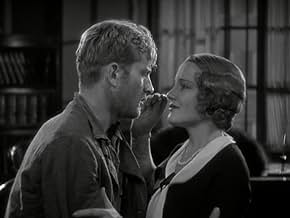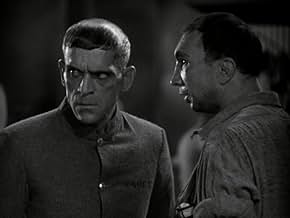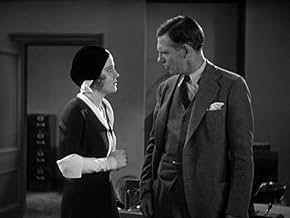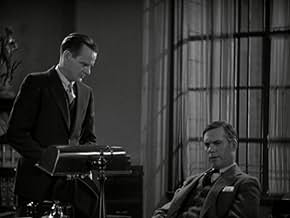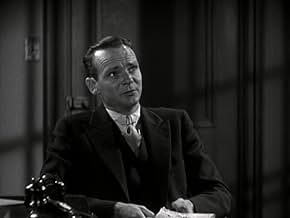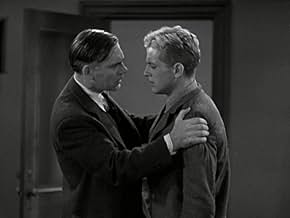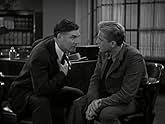IMDb RATING
6.9/10
1.6K
YOUR RATING
After a failed attempt at running for governor, D.A. Mark Brady is appointed warden of the state prison where many of the criminals he prosecuted are incarcerated.After a failed attempt at running for governor, D.A. Mark Brady is appointed warden of the state prison where many of the criminals he prosecuted are incarcerated.After a failed attempt at running for governor, D.A. Mark Brady is appointed warden of the state prison where many of the criminals he prosecuted are incarcerated.
- Director
- Writers
- Stars
- Nominated for 1 Oscar
- 3 wins & 1 nomination total
DeWitt Jennings
- Captain Gleason
- (as De Witt Jennings)
Paul Porcasi
- Tony Spelvin
- (as Paul Porcassi)
Richard Bishop
- Minor Role
- (uncredited)
Andy Devine
- Cluck - a Convict with knife
- (uncredited)
James Guilfoyle
- Detective Doran
- (uncredited)
Frank Hagney
- Prison Guard in Yard
- (unconfirmed)
- (uncredited)
- Director
- Writers
- All cast & crew
- Production, box office & more at IMDbPro
6.91.6K
1
2
3
4
5
6
7
8
9
10
Featured reviews
Well-intentioned, suspenseful but with poor dialogue
Robert Graham (Phillips Holmes) accidentally kills a man and is imprisoned for manslaughter. Some years later, the district attorney who - applying the criminal code verbatim - had got him into jail (Walter Huston) becomes prison warden and tries to rehabilitate him. That turns out to be hard because Graham has meanwhile learned another kind of criminal code: the values and standards that govern the behaviour of the prisoners. This is a well-intentioned film that is critical of the way the US prison system was run. It tells a good story and manages to generate a lot of suspense. The pacing is good, too - the thing gets never dull. There is even a bit of a romance, though this plays a rather minor role. I found the quality of the acting somewhat mixed. Huston, Holmes and Boris Karloff (who plays another prisoner) are doing very well, Constance Cummings (Huston's daughter and Holmes love interest) less so: At least in some scenes, she appeared rather wooden and stiff. What I found disappointing is the quality of the dialogue. Huston's default answer to almost anything he is told seems to be 'oh yeah?!' (a few years later - in 'It Happened One Night', 1934 - Clark Gable would make fun of dialogues that consisted of nothing but 'oh yeah?!'s). Whoever wrote the dialogues for 'The Criminal Code' did this otherwise good film no service.
"Somebody's Got To Pay"
In The Criminal Code the bywords of District Attorney Walter Huston is that where there is a crime, someone has to pay. Or if you can't do the time, don't do the crime as a later philosopher named Tony Baretta opined. And it's Huston's job to set the price when he prosecutes.
But Huston recognizes that young Phillips Holmes with a proper criminal defense attorney might do little time or even be acquitted. He smashed some poor guy's head in with a full bottle of bootleg hooch when he thought he was going for a gun. Still Holmes is convicted and he gets a ten year sentence.
Fast forward several years and Huston is no longer the District Attorney, he's now the warden of the prison that Holmes is incarcerated. Huston gives Holmes a chance and he makes him a trustee. Huston's daughter Constance Cummings even falls for Holmes.
But they have a different code among the convicts in prison and the biggest commandment is thou shalt not rat. When Boris Karloff does a particular rat in Holmes almost takes the fall for it because of that code.
The leads do a fine job in this, but the performances of Boris Karloff as the hardened convict and Clark Marshall as his victim really do stand out in The Criminal Code. Marshall especially, you can really feel his fear in his performance.
Beginning originally as a Broadway play, The Criminal Code was remade twice by Columbia Pictures, Harry Cohn not being one to let a good property go to waste. The two remakes are Penitentiary with Walter Connolly and John Howard and Convicted with Broderick Crawford and Glenn Ford.
The film holds up very well because the themes are eternal. Criminals have to pay the price when caught and rats are just as unpopular as ever.
But Huston recognizes that young Phillips Holmes with a proper criminal defense attorney might do little time or even be acquitted. He smashed some poor guy's head in with a full bottle of bootleg hooch when he thought he was going for a gun. Still Holmes is convicted and he gets a ten year sentence.
Fast forward several years and Huston is no longer the District Attorney, he's now the warden of the prison that Holmes is incarcerated. Huston gives Holmes a chance and he makes him a trustee. Huston's daughter Constance Cummings even falls for Holmes.
But they have a different code among the convicts in prison and the biggest commandment is thou shalt not rat. When Boris Karloff does a particular rat in Holmes almost takes the fall for it because of that code.
The leads do a fine job in this, but the performances of Boris Karloff as the hardened convict and Clark Marshall as his victim really do stand out in The Criminal Code. Marshall especially, you can really feel his fear in his performance.
Beginning originally as a Broadway play, The Criminal Code was remade twice by Columbia Pictures, Harry Cohn not being one to let a good property go to waste. The two remakes are Penitentiary with Walter Connolly and John Howard and Convicted with Broderick Crawford and Glenn Ford.
The film holds up very well because the themes are eternal. Criminals have to pay the price when caught and rats are just as unpopular as ever.
Criminally underrated!
The Criminal Code (1931) is often passed over when it comes to discussion of the films of Howard Hawks, but it's actually one of my favorites from him.
There are a lot of stagey aspects to be sure and the central love story is pretty boring, but there's just so much to love. The film experiments with sound, overlapping dialogue and using crowd noise as a plot element.
The two standout actors are Walter Huston and a pre-stardom Boris Karloff. Anytime either of them walks on screen, everyone else just evaporates. Huston does a great job making the audience love and despise his character. And Karloff is just mesmerizing as Galloway, a convict hell-bent on vengeance.
No masterpiece, but it is an early sign of Hawks' genius. And I would take it over Bringing Up Baby (1938) and His Girl Friday (1940) any day of the week.
There are a lot of stagey aspects to be sure and the central love story is pretty boring, but there's just so much to love. The film experiments with sound, overlapping dialogue and using crowd noise as a plot element.
The two standout actors are Walter Huston and a pre-stardom Boris Karloff. Anytime either of them walks on screen, everyone else just evaporates. Huston does a great job making the audience love and despise his character. And Karloff is just mesmerizing as Galloway, a convict hell-bent on vengeance.
No masterpiece, but it is an early sign of Hawks' genius. And I would take it over Bringing Up Baby (1938) and His Girl Friday (1940) any day of the week.
Familiar Material, Helped by Huston & Karloff
DA Brady sends young Graham to prison unjustly, and must redeem himself once he becomes the prison's warden.
The credits indicate icon Howard Hawks as the director; IMDb uncharacteristically lists no one; while Hawks' bio-site states he's the uncredited helmsman. I include this rather puzzling movie pedigree because I see very little of Hawks' characteristic style on screen. He may well have been adjusting to the new factor of sound (as others point out), but whatever the reason, the screenplay could have been filmed by any number of solid Hollywood craftsmen.
The movie itself has been made several times over, so the material is familiar. But except for Huston's dynamic performance and Karloff's formidable presence, there's not much to recommend beyond the story itself. The prison yard scenes are riveting with their marching phalanxes of inmates. Sort of like a non-musical Busby Berkeley. I also like that early scene where DA Brady (Huston) strips away shady lady Gertie's thin façade of respectability. To me, its spirited air bespeaks Hawks' guiding hand, as does Brady's surprisingly intense grilling of Graham. However, what should be a highlight, Ned's (Karloff) revenge killing of the squealer, is unnecessarily down-played for this pre-Code period.
Note how we're led to respect the inmates' code of conduct even though they are convicted criminals. Both the law and the inmates have their respective codes, but more importantly, the codes may well be linked by a common sense of justice. When, for example, those codes are broken by the squealer, on one hand, and by head guard Gleason, on the other, we're led to sympathize with the respective acts of retribution, bloody though they undoubtedly are. And since both acts are carried out by the hulking Ned, he becomes something of an avenging angel despite his gruesome appearance. It's the ambiguities of the two codes, united, perhaps, by a common sense of justice that suggests an interesting subtext to the story.
Anyway, in my little book, this is a Walter Huston showcase, proving again that an actor of less than handsome appearance could carry a Hollywood movie.
The credits indicate icon Howard Hawks as the director; IMDb uncharacteristically lists no one; while Hawks' bio-site states he's the uncredited helmsman. I include this rather puzzling movie pedigree because I see very little of Hawks' characteristic style on screen. He may well have been adjusting to the new factor of sound (as others point out), but whatever the reason, the screenplay could have been filmed by any number of solid Hollywood craftsmen.
The movie itself has been made several times over, so the material is familiar. But except for Huston's dynamic performance and Karloff's formidable presence, there's not much to recommend beyond the story itself. The prison yard scenes are riveting with their marching phalanxes of inmates. Sort of like a non-musical Busby Berkeley. I also like that early scene where DA Brady (Huston) strips away shady lady Gertie's thin façade of respectability. To me, its spirited air bespeaks Hawks' guiding hand, as does Brady's surprisingly intense grilling of Graham. However, what should be a highlight, Ned's (Karloff) revenge killing of the squealer, is unnecessarily down-played for this pre-Code period.
Note how we're led to respect the inmates' code of conduct even though they are convicted criminals. Both the law and the inmates have their respective codes, but more importantly, the codes may well be linked by a common sense of justice. When, for example, those codes are broken by the squealer, on one hand, and by head guard Gleason, on the other, we're led to sympathize with the respective acts of retribution, bloody though they undoubtedly are. And since both acts are carried out by the hulking Ned, he becomes something of an avenging angel despite his gruesome appearance. It's the ambiguities of the two codes, united, perhaps, by a common sense of justice that suggests an interesting subtext to the story.
Anyway, in my little book, this is a Walter Huston showcase, proving again that an actor of less than handsome appearance could carry a Hollywood movie.
"I'd turn the demons out of Hell for you."
Twenty year-old Robert Graham (Phillips Holmes) accidentally kills another man in a drunken brawl. District Attorney Mark Brady (Walter Huston) has to prosecute the young man, despite feeling sympathetic towards him. Graham is convicted to ten years in the state penitentiary. Six years later, D.A. Brady has been appointed warden of the prison and is appalled at what prison life has done to Graham. With help from his daughter (Constance Cummings), who falls in love with Graham, Brady gets the young man back on the right track. But all of it may come to naught when another prisoner is murdered and Graham is forced to choose between snitching and keeping quiet.
Phillips Holmes is not a name that most people, including myself, are familiar with. He retired from acting in 1938 and died in a mid-air collision in Canada four years later. This is probably his most well-known role and that's not saying much since this is hardly a well-known film. But he does a terrific job. Expectedly good performance from Walter Huston, arguably Hollywood's best actor in the early talkies. Also features Boris Karloff in one of his best pre-Frankenstein roles as a vengeful inmate who hates squealers.
Great early Howard Hawks crime drama. Nice Hawksian banter and overlapping dialogue, particularly in the early scenes with reporters. Remade twice, as Penitentiary in 1938 and Convicted in 1950. A must-see for fans of Hawks, Huston, and Karloff.
Phillips Holmes is not a name that most people, including myself, are familiar with. He retired from acting in 1938 and died in a mid-air collision in Canada four years later. This is probably his most well-known role and that's not saying much since this is hardly a well-known film. But he does a terrific job. Expectedly good performance from Walter Huston, arguably Hollywood's best actor in the early talkies. Also features Boris Karloff in one of his best pre-Frankenstein roles as a vengeful inmate who hates squealers.
Great early Howard Hawks crime drama. Nice Hawksian banter and overlapping dialogue, particularly in the early scenes with reporters. Remade twice, as Penitentiary in 1938 and Convicted in 1950. A must-see for fans of Hawks, Huston, and Karloff.
Did you know
- TriviaThe prison yard sequence was shot at M-G-M, using the set originally built for "The Big House" (1930).
- GoofsPaul Porcasi's name is spelled "Porcassi" in the opening credits.
- Quotes
Mark Brady: [to Graham] Tough luck, Bob, but that's the way they break sometimes. You got to take them the way they fall.
- Crazy creditsThe film's credits do not say that Howard Hawks directed the film; instead, they say that the film is "A Howard Hawks Production."
- ConnectionsAlternate-language version of El código penal (1931)
Details
- Release date
- Country of origin
- Language
- Also known as
- De dömdas lag
- Filming locations
- Production company
- See more company credits at IMDbPro
- Runtime
- 1h 37m(97 min)
- Color
Contribute to this page
Suggest an edit or add missing content

